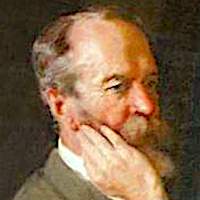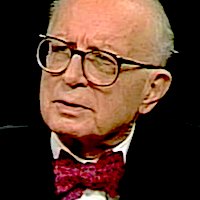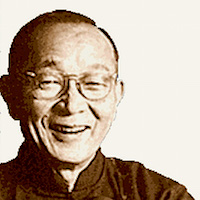

Tao Te Ching

William James
1842 – 1910 CE
"Father of American psychology”
"Father of American psychology,” and one of the most significant American philosophers; William James established the philosophical school called pragmatism, functional psychology, and radical empiricism. His wealthy father wanted William and his brother Henry to be educated in a way free from dogma and goal-oriented career study. This led William into the fields of chemistry, physiology, anatomy, a medical degree, and a Harvard professorship where he set up the first American experimental psychology laboratory and became the first to offer a U. S. psychology course. Suffering through severe mental depression and serious health issues, he turned to philosophy and an evolved understanding of the self as a spiritual essence, a continual stream of consciousness much deeper and more meaningful than our material and social identifications.
Lineages
American (USA)
Eras
Western
Post-Romantic Age (1850 – 2018 CE)Gilded Age (1860 – 1900 CE)
Victorian (1837 – 1901 CE)
American Civil War (1861 – 1865 CE)
Chinese
Qing dynasty (1644 – 1912 CE)Unlisted Sources
Collected Essays, 1920
Gospel of Relaxation
Last words found on his desk
Letter to H. G. Wells, 1906
Memories and Studies (1911)
On a Certain Blindness in Human Beings (1939)
Pragmatism
Pragmatism (1907)
Principles of Psychology, 1890
Talks to Teachers on Psychology, 1899
The Meaning of Truth (1909)
The Moral Equivalent of War
The Varieties of Religious Experience, 1902
The Will to Believe
The Will to Believe, 1897
Quotes by William James (60 quotes)
“There is no conclusion. What has concluded that we might conclude in regard to it There are no fortunes to be told and there is no advice to be given. Farewell.”
from Last words found on his desk
Comments: Click to comment
“We stand in much the same relation to the whole of the universe as our canine and feline pets do to the whole of human life… tangents to curves of history… as we are tangent to the wider life of things.”
from Pragmatism
Comments: Click to comment
“The prince of darkness may be a gentleman, as we are told he is, but whatever the God of earth and heaven is, he can surely be no gentleman.”
Comments: Click to comment
“I am done with great things and big plans, great institutions and big success. I am for those tiny, invisible loving human forces that work from individual to individual, creeping through the crannies of the world like so many rootlets which will rend the hardest monuments of pride.”
Comments: Click to comment
“In the practical use of our intellect, forgetting is as important as remembering.”
from Principles of Psychology, 1890
Comments: Click to comment
“There is an everlasting struggle in every mind between the tendency to keep unchanged, and the tendency to renovate... Our education is a ceaseless compromise between the conservative and the progressive”
from Principles of Psychology, 1890
Comments: Click to comment
“As a rule, we disbelieve all facts and theories for which we have no use.”
from The Will to Believe, 1897
Comments: Click to comment
“Religion, in short, is a monumental chapter in the history of human egotism.”
from The Will to Believe, 1897
Comments: Click to comment
“The praise of poverty needs to be once more boldly sung. We have grown literally afraid to be poor. We despise anyone who elects to be poor in order to simplify and save his inner life”
from The Will to Believe, 1897
Comments: Click to comment
“There is no worse lie than a truth misunderstood by those who hear it.”
from The Varieties of Religious Experience, 1902
Comments: Click to comment
“The moral flabbiness born of the exclusive worship of the bitch-goddess SUCCESS... is our national disease.”
from Letter to H. G. Wells, 1906
Comments: Click to comment
“Greek history is a panorama of war for war's sake... the utter ruin of a civilization which in intellectual respects was perhaps the highest the earth has ever seen. The wars were purely piratical. Pride, gold, women, slaves, excitement, were their only motives.”
Comments: Click to comment
“The war against war is going to be no holiday excursion or camping party. The military feelings are too deeply grounded to abdicate their place among our ideals until better substitutes are offered than the glory and shame that comes to nations as well as individuals from the ups and downs of politics”
from The Moral Equivalent of War
Comments: Click to comment
“The greatest weapon against stress is our ability to choose one thought over another.”
Comments: Click to comment
“The greatest use of life is to spend it on something that will outlast it.”
Comments: Click to comment
“A great many people think they are thinking when they are merely rearranging their prejudices.”
Comments: Click to comment
“The art of being wise is the art of knowing what to overlook.”
Comments: Click to comment
“The greatest discovery of my generation is that a human being can alter his life by altering his attitudes.”
Comments: Click to comment
“Most people never run far enough on their first wind to find out they've got a second.”
Comments: Click to comment
“The deepest principle in human nature is the craving to be appreciated.”
Comments: Click to comment
“Act as if what you do makes a difference. It does… Believe that life is worth living, and your belief will help create the fact.”
Comments: Click to comment
“Religion is a monumental chapter in the history of human egotism.”
from The Varieties of Religious Experience, 1902
Comments: Click to comment
“Religious experience spontaneously and inevitably engenders myths, superstitions, dogmas, creeds, metaphysical theologies, and criticisms of one set of these by the adherents of another.”
from The Varieties of Religious Experience, 1902
Comments: Click to comment
“Opposition between the men who have and the men who are is immemorial.”
from The Varieties of Religious Experience, 1902
Comments: Click to comment
“Consciousness does not appear to itself chopped up in bits. Such words as ‘chain’ or ‘train’ do not describe it well. It is nothing jointed; it flows. A ‘river’ or a ‘stream’ are the metaphors that describe it best.”
from Principles of Psychology, 1890
Comments: Click to comment
“[religion is] the belief that there is an unseen order, and that our supreme good lies in harmoniously adjusting ourselves thereto.”
from The Varieties of Religious Experience, 1902
Comments: Click to comment
“that lavishly generous confidence in the worthiness of average human nature to be told all truth, the lack of which in Goethe made him an inspiration to the few but a cold riddle to the many.”
from Collected Essays, 1920
Comments: Click to comment
“[Al-Ghazzali's autobiography is important for] the purely literary student who would like to become acquainted with the inwardness of religions other than the Christian”
from The Varieties of Religious Experience, 1902
Comments: Click to comment
“Habit is the enormous flywheel of society, its most precious conservative agent. There is no more miserable human being than one in whom nothing is habitual but indecision.”
Comments: Click to comment
“Romeo wants Juliet as the filings want the magnet and, if no obstacles intervene, he moves toward her by as straight a line as they. But if a wall be built between them, they do not remain idiotically pressing their faces against its opposite sides.”
Comments: Click to comment
“The eternal forces of truth always work in the individual and immediately in an unsuccessful way, underdogs always until history comes—after they are long dead—and puts them on the top.”
from Memories and Studies (1911)
Comments: Click to comment
“The whole function of philosophy ought to be to find out what definite difference it will make to you and me, at definite instances in our life, if this world-formula or that world-formula be the true one.”
from Pragmatism (1907)
Comments: Click to comment
“There can be no difference anywhere that doesn't make a difference elsewhere”
from Pragmatism (1907)
Comments: Click to comment
“New truth is always a go-between... It marries old opinions to new facts so as ever to show a minimum of jolt, a maximum of continuity.”
from Pragmatism (1907)
Comments: Click to comment
“The deadliest enemies of nations are not their foreign foes; they always dwell within their own borders. And from these internal enemies civilization is always in need o being saved.”
from Memories and Studies (1911)
Comments: Click to comment
“Democracy is still upon its trial. The civic genius of our people is its only bulwark and neither laws... monuments.. battleships... libraries... mechanical invention... churches... universities... nor political adroitness can save us from degeneration if the inner mystery be lost.”
from Pragmatism (1907)
Comments: Click to comment
“These then are my last words to you: Be not afraid of life. Believe that life is worth living and your belief will help create the fact.”
from The Will to Believe
Comments: Click to comment
“Science, like life, feeds on its own decay. New facts burst old rules; then newly divined conceptions bind old and new together into a reconciling law.”
from The Will to Believe
Comments: Click to comment
“The opposition between the men who have and the men who are is immemorial.”
from The Varieties of Religious Experience, 1902
Comments: Click to comment
“The prevalent fear of poverty among the educated classes is the worst moral disease from which our civilization suffers.”
from The Varieties of Religious Experience, 1902
Comments: Click to comment
“Why does the painting of any paradise or utopia—in heaven or on earth—awaken such yearnings for nirvana and escape?... lubberlands, pure and simple, one and all.”
from Pragmatism (1907)
Comments: Click to comment
“If this be the whole fruit of victory— that a race of creatures of such unexampled insipidity should succeed, and protract... their contented and inoffensive lives— better to lose rather than win the battle.”
from Pragmatism (1907)
Comments: Click to comment
“True ideas are those that we can assimilate, validate, corroborate, and verify. False ideas are those that we cannot.”
from The Meaning of Truth (1909)
Comments: Click to comment
“[We] must all work to keep our precious birthright of individualism and freedom from these institutions (church, army, aristocracy, royalty). Every great institution is perforce a means of corruption.”
Comments: Click to comment
“I devoutly believe in the reign of peace and in the gradual advent of some sort of socialistic equilibrium. The fatalistic view of the war-function is to me nonsense”
from The Moral Equivalent of War
Comments: Click to comment
“Our normal waking consciousness, rational consciousness as we call it, is but one special type of consciousness, while all about it, parted from it by the filmiest of screens, there lie potential forms of consciousness entirely different.”
Comments: Click to comment
“My first act of free will shall be to believe in free will.”
Comments: Click to comment
“A great many people think they are thinking when they are only rearranging their prejudices.”
Comments: Click to comment
“It has so little bond with externals... the ground of a man's joy is often hard to hit.”
from Talks to Teachers on Psychology, 1899
Comments: Click to comment
“the true realism, always and everywhere, is that of the poets: to find out where joy resides, and give it a voice far beyond singing. For to miss the joy is to miss all.”
from Talks to Teachers on Psychology, 1899
Comments: Click to comment
“Only in some pitiful dreamer, some philosopher, poet, or romancer, or when the common practical man becomes a lover, does the hard externality give way, and a gleam of insight into the vast world of inner life beyond us, so different from that of outer seeming, illuminate our mind.”
from Talks to Teachers on Psychology, 1899
Comments: Click to comment
“acquaintance with reality's diversities is as important as understanding their connection. The human passion of curiosity runs on all fours with the systematizing passion.”
from Pragmatism
Comments: Click to comment
“What our intellect really aims at is neither variety nor unity taken singly, but totality.”
from Pragmatism
Comments: Click to comment
“Space and time are thus vehicles of continuity by which the world's parts hang together.”
from Pragmatism
Comments: Click to comment
“Human efforts are daily unifying the world more and more in definite systematic ways.”
from Pragmatism
Comments: Click to comment
“everything that exists in influenced in some way by something else... a vast network of acquaintanceship”
Comments: Click to comment
“This notion of an all-enveloping noetic unity in things is the sublimest achievement of intellectualist philosophy.”
from Pragmatism
Comments: Click to comment
“The Truth; what a perfect idol of the rationalistic mind!... truths are man-made products... Truth grafts itself on previous truth, modifying it in the process”
from Pragmatism
Comments: Click to comment
“so blind and dead does the clamor of our own practical interests make us to all other things... Only your mystic, your dreamer, or your insolvent tramp of loafer can afford an occupation that will change the usual standards of human value in the twinkling of an eye... which it takes a hardworking conventional man a life time to build up.”
from On a Certain Blindness in Human Beings (1939)
Comments: Click to comment
“Bottled Lightning, in truth, is one of our American ideals... a wild-eyed look either of too desparate eagerness and anxiety or of too intense responsiveness and good-will... Intensity, rapidity, vivacity of appearance, are indeed with us something of a nationally accepted ideal”
from Gospel of Relaxation
Comments: Click to comment
Quotes about William James (6 quotes)

“[William] refused altogether to follow his brother Henry into fastidious snobbishness.”
Comments: Click to comment

“Go, then, to William James… Until you have surrounded James, you need not bother with such transitory psychological fashions as psychoanalysis and behaviorism, and when you have absorbed James, you will be immune to these epidemics.”
Comments: Click to comment

“Myth is not just fantasy and not just fact but exists in a limbo, in the world of the Will to Believe which William James has written about so eloquently and so perceptively.”
Comments: Click to comment

“William James used to preach the ‘will to believe.’ For my part, I should wish to preach the ‘will-to-doubt.’ None of our beliefs are quite true; all at least have a penumbra of vagueness and error. What is wanted is not the will to believe, but the will to find out, which is the exact opposite.”
Comments: Click to comment

“William James was an American phenomenon, crude, free, forever curious and undisciplinable.”
Comments: Click to comment

“James’ doctrine is an attempt to build a superstructure of belief upon a foundation of skepticism, and like all such attempts, it is dependent on fallacies… a form of the subjectivistic madness which is characteristic of most modern philosophy.”
Comments: Click to comment
Comments (0)